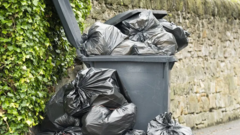What Did the Council Find in Black Bags from Every Household?

Published: 2025-11-04 00:00:12 | Category: wales
The council area of Blaenau Gwent has conducted inspections of black bin waste for every household over the past eight years, a strategy aimed at improving recycling rates. With over 32,000 properties checked since 2017, the approach has revealed both successes and challenges in reaching the local recycling target of 70%.
Last updated: 15 October 2023 (BST)
What’s happening now
Blaenau Gwent council officials have confirmed that every household in the area has undergone inspections of their black bin waste. This initiative, part of a broader strategy to monitor and improve recycling practices, has seen over 32,000 properties inspected since 2017. The latest report indicates a slight increase in recycling rates, moving from 66.18% in 2023-24 to 68.89% in 2024-25, although this remains below the council's target of 70%.
Key takeaways
- Every household in Blaenau Gwent has had their black bin waste inspected over the past eight years.
- More than 32,000 properties have been involved in the inspections since 2017.
- The recycling rate increased to 68.89% for 2024-25, still short of the 70% target.
Timeline: how we got here
The following timeline outlines the major milestones in Blaenau Gwent's waste management strategy:
- 2017: Inspections of black bin waste begin across the council area.
- 2023: Recycling rate recorded at 66.18%.
- 2024: Recycling rate increases to 68.89% as of the end of the year.
What’s new vs what’s known
New today/this week
The council's scrutiny committee recently discussed the ongoing waste inspection initiative, revealing the total number of inspections and the current recycling rates. The proactive measures taken by waste wardens, including educational visits to households, are highlighted as effective interventions.
What was already established
The strategy of inspecting black bin waste was already known, but the scale of the inspections—covering every household in the borough—was not fully disclosed until this recent meeting. The fines for non-compliance and the council's commitment to promoting recycling through community engagement were also previously acknowledged.
Impact for the UK
Consumers and households
For residents of Blaenau Gwent, the inspections aim to encourage better recycling practices, ultimately reducing landfill waste and promoting sustainability. The approach also seeks to educate households on effective recycling, which could lead to lower waste disposal fees in the long term.
Businesses and jobs
Local businesses involved in waste management and recycling may see changes in operational practices due to increased scrutiny and enforcement. Effective recycling practices can lead to cost savings and may create jobs in the waste management sector as the demand for recycling services grows.
Policy and regulation
This initiative aligns with broader UK government policies on waste management and recycling, which aim to reduce landfill usage and increase recycling rates across the country. The council's actions may serve as a model for other local authorities looking to improve their waste management practices.
Numbers that matter
- 32,000: The number of households inspected for black bin waste since 2017.
- 66.18%: Recycling rate for 2023-24.
- 68.89%: Recycling rate for 2024-25, indicating a modest improvement.
- £100: The potential fine for households found not complying with recycling guidelines.
Definitions and jargon buster
- FPN (Fixed Penalty Notice): A fine issued for specific offences, such as failing to comply with recycling regulations.
- HWRC (Household Waste and Recycling Centre): Facilities where residents can take their waste and recyclables for proper disposal or recycling.
How to think about the next steps
Near term (0–4 weeks)
Residents should ensure they understand the recycling requirements and properly separate their waste. The council may be increasing its outreach efforts to educate households on recycling best practices.
Medium term (1–6 months)
Continued monitoring and potential enforcement actions may occur as the council seeks to reach its 70% recycling target. Households that do not comply might face penalties, while those that improve their recycling habits could benefit from reduced waste disposal fees.
Signals to watch
- Upcoming reports from the council on recycling rates and enforcement actions.
- Community feedback on the waste wardens' educational outreach efforts.
- Changes in local waste management policies or fines for non-compliance.
Practical guidance
Do
- Separate recyclables from general waste to avoid penalties.
- Engage with waste wardens if approached for guidance on recycling practices.
- Stay informed of local recycling policies through council communications.
Don’t
- Ignore notifications from the council regarding waste presentation on collection days.
- Assume all plastics are recyclable; check local guidelines for specifics.
- Present contaminated waste, as this could lead to enforcement actions.
Checklist
- Ensure waste is properly sorted into recycling and general waste bins.
- Verify that materials are clean and dry before placing them in recycling bins.
- Familiarise yourself with the council's recycling guidelines.
- Participate in community outreach sessions about recycling.
- Monitor your waste disposal patterns and adjust as necessary.
Risks, caveats, and uncertainties
While the council's strategy has led to increased recycling rates, there is a risk that enforcement actions may lead to public backlash if households feel unfairly targeted. Additionally, the effectiveness of educational outreach by waste wardens will depend on community engagement levels, which can vary widely. The ongoing challenge remains in achieving the ambitious target of 70% recycling, especially as waste disposal habits are deeply ingrained in many households.
Bottom line
The proactive inspections of black bin waste in Blaenau Gwent aim to foster a culture of recycling and sustainability. As the council strives to reach its 70% recycling target, residents are encouraged to engage with the initiatives and improve their waste disposal practices. Understanding and complying with recycling guidelines will play a crucial role in the community's overall waste management success.
FAQs
What is the purpose of inspecting black bin waste?
The inspections aim to monitor recycling compliance and educate households on best recycling practices to reduce landfill waste effectively.
What happens if a household is found to be non-compliant?
If a household is found to be non-compliant, they may receive a Fixed Penalty Notice (FPN) and could face further prosecution if fines are not paid.
How can residents improve their recycling practices?
Residents can improve recycling by properly sorting waste, ensuring recyclables are clean and dry, and engaging with local waste wardens for guidance.



